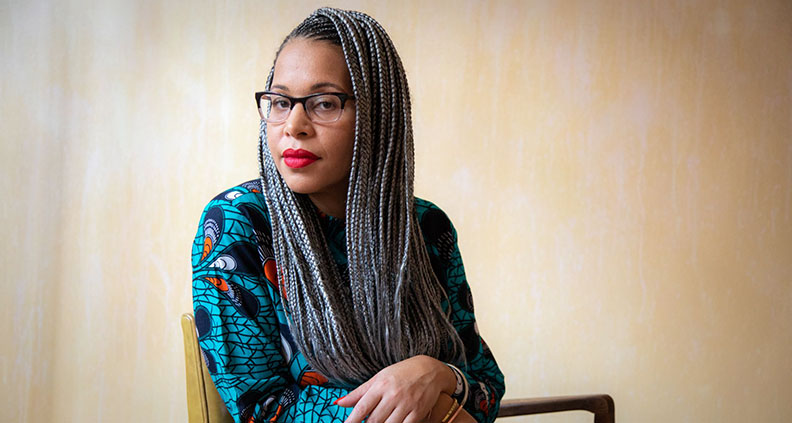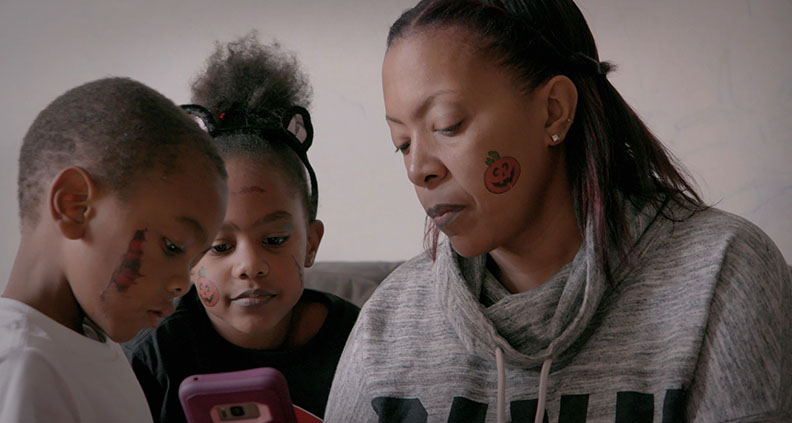Interview: ‘Through the Night’ Doc Spotlights the Struggles of Modern Childcare
With the United States once again contending with the sudden contraction of its economy—this time thanks to COVID-19, not subprime mortgages—folks outside of the 1% are once again in a scramble trying to make a living. For many, this means lashing together a shaky framework of part-time gigs, side-hustles and the stacking of two, three, four different jobs on top of each other. And these jobs of course gobble up time, frequently taking people away from their families.
The result? An increased dependence by overworked Americans on 24-hour daycare providers to assist with childcare, which in turn can tax daycare staff and resources to their limits. This cycle of desperation and makeshift family is the subject of filmmaker Loira Limbal’s new nonfiction feature Through the Night, which spotlights the experiences of two working mothers and childcare providers—“Nunu” and “Pop Pop” Hogan—as their personal and professional lives intersect with a 24-hour daycare in New Rochelle, New York.
Limbal’s film, which had its virtual premier at this year’s Tribeca Film Festival, currently boasts a 100% fresh rating on Rotten Tomatoes and is being released this weekend through virtual cinemas nationwide.
We recently spoke to Limbal and film’s editor, Malika Zouhali-Worrall—a Film Independent Fellow who participated in our 2011 Documentary Lab [currently accepting submission] and Fast Track programs—about Through the Night, its celebration of working women and their approach to nonfiction storytelling. Here’s the conversation:
THROUGH THE NIGHT

To start, can you tell us what Through the Night is about?
Limbal: My point of departure was really a desire to create a portrait of the universe of the daycare featured in the film, Dee’s Tots, which is a 24-hour daycare center. We follow two different mothers whose children attend the daycare. The reason I was really compelled to the subject matter and the story is because my mother raised me and my sisters working the nightshift herself. I’m the oldest of four children and she raised us working as a home health aide, working from 8:00pm at night making minimum wage. When I learned about this particular daycare, I was immediately kind of stuffed into my own childhood memories. I was thinking a lot about my mother and all the women like my mother and, you know, the fact that this is their reality.
What made cinema verité the correct filmmaking approach for this material?
Limbal: The real emphasis was to make it personal. This is my mother’s story, the story of so many women of color that I grew up with. They don’t ever get a chance to see their stories reflected anywhere with any kind of nuance and curiosity. So I really wanted to make something that would feel like a portrait, like a love letter to these women. One of the biggest types of harm that we can cause ourselves is to internalize what the larger society tells us: that our lives do not matter, that we don’t know, that we’re not worthy and we’re not valuable. And so that informs the decision to make a verité film, because I want it, I need it. It’s a love letter.
Malika, when did you get involved in the process, what are the challenges presented by that form of direct storytelling?
Zouhali-Worrall: I first got formally involved when Loira shared the idea of the film with me pretty early on, and I was super excited about it. It just sounded like such an important and special project.
In editing, what are some of the challenges of telling a story like this, where the verité footage you’re working with perhaps isn’t saying everything you need to say in terms of exposition?
Zouhali-Worrall: Initially, there was an approach Loira was taking where we were trying to avoid using relying on interviews too much. And then there was this moment when both Loira and I acknowledged that the interview material she had captured was so powerful, because Nunu and Patrick and Marisol and Shimona peak so powerfully about their situation. We just felt like the film would be lacking if like their voices, in their analysis of their situation, couldn’t be added.

Loira, can you talk about the process of building trust with your subjects? How did you approach them? How did you get them on board with this project?
Limbal: In terms of building trust with the folks in the film, it was not a long process. I cold-called them one day and I said this is what I do, I read an article about your day care and I would like to talk to you about making a documentary film, please take a meeting with me. She said, “Let me talk to my husband and I will call you back,” and she did. I met with them, and in that first meeting we ended up sitting and talking for several hours. I ended up sharing quite a bit of my work as a documentary filmmaker, as well as my current experiences as a single working mother, sharing a bit about my mother’s experience, saying “This is why I am interested in telling the story and this is why I’m passionate,” just like laying it all out there and then getting her response.
What’s that collaboration like with a documentary subject during production?
Limbal: From the first day, I remember I said to her several times what the process could look like. I also shared what I thought could be the outcome of it, the best case scenario, the worst case scenario, while telling them I had no control over what the outcome would be, giving her as much information as I could. And in that conversation I stressed that I understand that these are people’s children; I’m a mother myself, I’m sensitive and I’m willing to follow any parameters, that whatever you need let me know, we’ll work around it.
Malika, you were in Film Independent’s Documentary Lab. Can you describe what that experience was like?
Zouhali-Worrall: I was in the first ever (!) Doc Lab in 2010, which was very early in my filmmaking career. I chose to apply because back then I had no idea how to finish, premiere, sell or distribute a film. The Lab introduced us to speakers who gave us a crash course in a lot of the essentials, but it also introduced me to a fantastic cohort and community of documentary filmmakers.
What the biggest piece of practical know-how you took from the Lab that was utilized in cutting Through the Night?
Zouhali-Worrall: To this day, I still regularly reference the fair use concepts and case studies that Michael Donaldson shared with us when he came in to the Lab, which I definitely put to good use while editing Through The Night.
Through the Night will be released through virtual cinemas beginning tomorrow, Friday, December 11. For more information, please visit the film’s website.
Film Independent Artist Development promotes unique independent voices by helping filmmakers create and advance new work. To become a Member of Film Independent, just click here. To support us with a donation, click here.